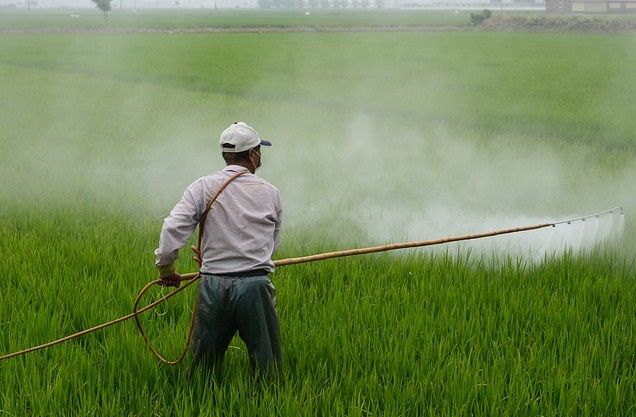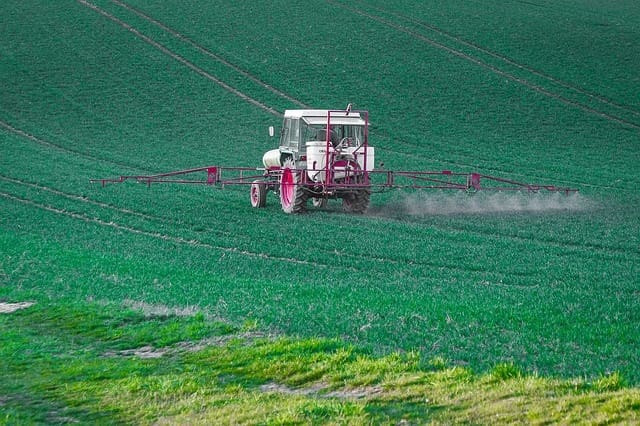Mexico has three years to get rid of glyphosate
The agrotoxic glyphosate penetrates the soil, filters into the water, and its residues remain on the crops; this is how we eat and drink it.

On December 31, the last day of 2020, the decree of President Andres Manuel Lopez Obrador was published in the Official Journal of the Federation to gradually substitute the use of glyphosate herbicide on crops since it is an agrochemical with harmful effects on health and "probably carcinogenic", giving a deadline of January 31, 2024, to achieve total replacement.
The purpose of this Decree is to establish the actions that must be carried out by the agencies and entities that make up the Federal Public Administration, to gradually substitute the use, acquisition, distribution, promotion, and import of the chemical substance called glyphosate and the agrochemicals used in our country that contain it as an active ingredient, with sustainable and culturally adequate alternatives that allow for the maintenance of production and are safe for human health, the biocultural diversity of the country and the environment.
Days before the publication of the decree, Francisco Javier Trujillo Arriaga, chief director of the National Service of Health, Innocuousness and Agrifood Quality (Senasica), indicated to El Sol de Mexico that "it is not proven that (glyphosate) is carcinogenic. This is not a conclusive statement. If the Ministry of Health were sure today that it is in that condition, it would have the legal elements to withdraw it from the market. The problem is that it is an unproven presumption," he states in an interview.
At least 20 countries have made the decision not to restrict its use because there is no evidence, as the World Health Organization (WHO) said, that it is carcinogenic. These economies include Australia, Canada, the United States, and most of the economies of the European Union. While there are others, such as France, that have eliminated it.
In May 2019, the company Monsanto, now owned by the multinational Bayer, was forced to pay compensation of two billion dollars to an elderly couple in California who fell ill with cancer from one of the company's glyphosate-based herbicides

Why Say NO to Glyphosate: What Industrial Agriculture Is Hiding
When people are being poisoned by what they consume as food, on the principle of responsibility their authorities cannot remain impassive, much less sink into indolence, and allow hunger to thrive and death practices to be encouraged, under the pretext of "producing food".
The reflection is timely in times of pandemic and in the midst of a public discussion on the use of the agrochemical called glyphosate, an industrial agent of death that is increasingly close to the life of every human being.
Glyphosate is the most widely used herbicide in the world in agriculture, forestry, gardening, and even in domestic activities. This chemical invention was first marketed in the 1970s by the Monsanto company, under the name Round'Up.
Since then and until 2014, more than 8.6 billion kilograms of this herbicide, which penetrates the soil, filter into the water, and its residues remain on the crops, had been sprayed on the planet. So we have eaten and drunk glyphosate, so it has reached the human body and caused cancer, pain, and death.
In June of this year, the German company Bayer signed an agreement worth between 8.8 and 9.6 billion dollars to settle more than 125,000 claims in the United States against Round'Up, the glyphosate-based pesticide marketed by its subsidiary Monsanto, which was acquired in 2018. The U.S. plaintiffs accuse this pesticide of being carcinogenic, according to the Circ, a branch of the World Health Organization (WHO), cited by dw.com
For almost half a century a persuasive and successful campaign extolled the use of glyphosate, and the absence of scientific studies on the effects on health and the environment favored that the use of the agrotoxic spread throughout the world with impunity.
That panorama has changed after civil organizations defending the environment, health, and human rights promoted numerous critical investigations to document the harmful effects of the pesticide. Based on this evidence, glyphosate has been banned or restricted in Austria, Germany, France, Italy, Luxembourg, Thailand, Bermuda, Sri Lanka, and some regions of Spain, Argentina, and New Zealand.
Agroindustry uses glyphosate mainly in its monocultures to exterminate what it calls weeds, that is, grasses that are part of the traditional diet of the native peoples without being inserted in the massive commercial circuit, such as the diverse quelites, or the acahuales useful for fodder.
What industrial agriculture does not reveal is that glyphosate-tolerant transgenic crops generate encephalopathies, autism, parkinsonism, malformations, and various types of cancer, in addition to affecting people's endocrine, reproductive, immune, digestive, hepatic, renal, nervous, and cardiovascular systems.
It also affects different species of crustaceans, mollusks, oligochaetes, algae, fungi, phytoplankton and zooplankton, amphibians, turtles, arachnids, birds, mammals, and, most worryingly, beneficial and pollinating insects such as bees and butterflies, as well as hummingbirds.
After an extensive review of the scientific literature, the WHO decided to classify glyphosate as "probably carcinogenic to humans". More recently, the Ramazzini Institute in Italy (www.glyphosatestudy.org) also revealed that glyphosate weakens the human immune system in three ways: NHL cancer, destruction of an essential enzyme, and modification of the intestinal flora, leaving people unprotected against infections such as the Covid-19 coronavirus.
It is well known that in Mexico, the country of origin and biodiversity of corn, each person consumes an average of half a kilogram of this cereal daily, basic food in the national diet. The unfortunate fact is that 10 million tons of corn imported annually from the United States must be used only for livestock feed or highly processed industrial inputs. However, 90.4% of the tortillas consumed in Mexico contain transgenic corn sequences, as do 82% of the toasts, flours, cereals, and snacks made from this grain.
The worrisome data is a finding of the scientific team of the National Autonomous University of Mexico and the Autonomous Metropolitan University, which found in 387 samples of corn products collected in tortilla shops and supermarkets, mainly in the Metropolitan Area of the Valley of Mexico, the alarming presence of transgenic corn genes. And although they also found transgenes in the most artisanal tortillas, they did not find glyphosate in these.
This occurs because corn plants have been transformed in laboratories in the United States to resist plagues and tolerate glyphosate herbicide, according to the magazine Agroecology and Sustainable Food Systems,
More than 85 percent of the GM corn produced in the United States is tolerant to glyphosate, a pesticide that is sprayed on the GM corn that tolerates it, penetrates the plants, and gets into the kernels, and thus gets into the tortillas and other foods made from corn.
The data is shocking, but even more so because transgenic corn is not allowed in Mexico in open fields, since a collective lawsuit is in the process that prevents it since 2013, the year in which a precautionary measure was applied that prohibited its sowing while the legal process lasted.
It is absurd to import transgenic grain since Mexico produces enough corn for human consumption: native and non-transgenic hybrid. In 2016 it produced 25.7 million tons of corn, of which 12.3 million were sold for human consumption, 4.2 million for self-consumption, 4.4 million for the livestock sector, and 1.5 million for export.
In November 2019, under the precautionary principle for the prevention of risks in environmental matters, the Ministry of the Environment denied the import of one thousand tons of glyphosate. And also in 2019, the Mexican Government created the Inter-Ministerial Group of Health, Food, Environment, and Competitiveness to have a national vision of the major health and environmental problems, such as the one caused by glyphosate.
Given the scientific evidence of glyphosate's toxicity, which shows the impacts on human health and the environment, there is a firm move towards the gradual reduction of glyphosate use, until its total prohibition is achieved in 2024, and a safer, healthier, and more environmentally friendly agrifood system is promoted. In that sense, the critical route for the gradual reduction of the herbicide with alternative methods is refined.




